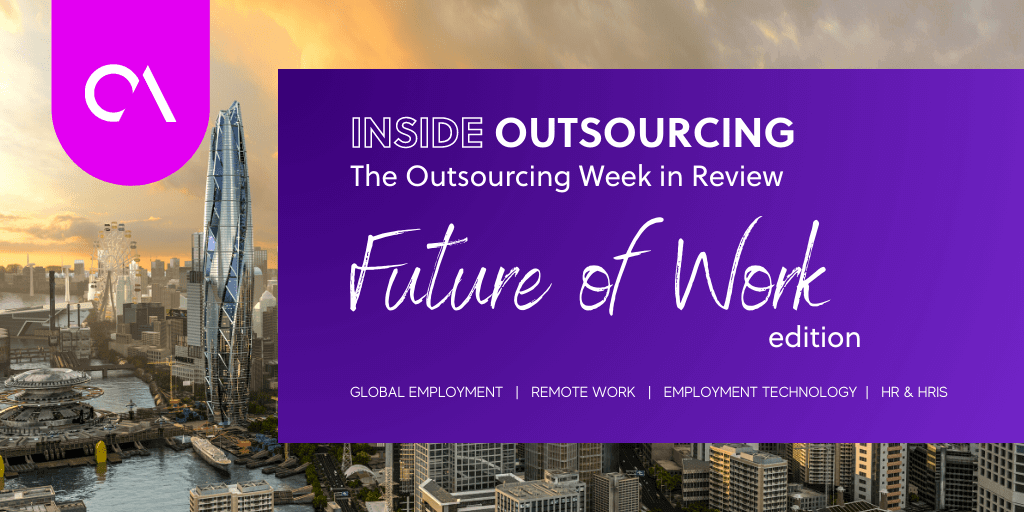Welcome to Inside Outsourcing: The Outsourcing Week in Review
THE WEEK IN REVIEW
Happy Friday! Ready to wrap up your work and dive into the weekend? Before you do, catch the latest edition of Inside Outsourcing: Future of Work. This week, we explore evolving work arrangements, digital transformations, and, of couse, AI. Enjoy!
Surprisingly, London, New York, and Bangkok emerged as the top destinations for digital nomads worldwide. According to an analysis of Instagram posts by Resume.io, London led globally, while New York topped the list in North America, and Bangkok stood out in the Asia & Oceania region. Dr. Rochelle Haynes, head of research at the Association for the Future of Work, predicts that people will continue finding remote work opportunities while traveling worldwide despite the current global economic climate.
But it’s not just the location that matters to the new generation of workers.
Universum Talent Survey 2023 revealed that Gen Z job seekers in the Philippines prioritize training, work environment, and future earning potential when selecting employers. Remote work appeals to 82% of young employees, while 74% prefer working in well-established firms over startups. Notably, young Filipino workers’ average annual salary expectations dropped by 25% to PHP374,403 (US$6,671), with women expecting to be paid 10% less than their male counterparts.
Meanwhile, a study by HR services provider SD Worx showed that 37% of European employees struggle with the pace of digitalization. The digital gap is most notable among Danish, Irish, and Croatian employees. To address this, companies invest in employee-oriented HR applications and training, with Swiss, British, and Spanish companies leading in HR digitalization investments.
While companies navigate these transformations, friction surfaces. Amazon‘s recent return-to-office mandate and large-scale layoffs prompted a walkout among 2,000 global employees. The protest, organized by Amazon Employees for Climate Justice (AECJ), highlighted the workers’ lack of confidence in the company’s leadership. AECJ also questioned Amazon’s environmental record and “harmful unilateral decisions” that could affect minorities within its workforce. Similar discontent is brewing at Salesforce due to an intensified focus on a “performance culture” and the associated layoffs. The software firm recently raised its adjusted operating margin guidance for FY2024 to 28%, attributing the positive results to its emphasis on performance metrics. However, the intensified focus on metrics is reportedly affecting employee morale. Despite the discontent, Salesforce executives said that performance scrutiny would continue as they expect customers to continue reviewing every deal made by the company.
As businesses and employees adjust, governments are also stepping up their game.
Australia will implement stronger measures to protect temporary visa holders from workplace exploitation. The proposed legislation would include criminalizing coercion into visa condition breaches, prohibiting exploitative employers from hiring temporary visa workers, introducing stricter penalties, and repealing a section of the Migration Act that discourages reporting exploitation. An AU$50 million funding will also be allocated to the Australian Border Force to enforce these measures. Minister for Immigration, Citizenship, and Multicultural Affairs Andrew Giles will introduce the legislation to Parliament in the upcoming weeks.
Workplace AI, a primary catalyst for many changes, raises concerns. A survey by trade union Prospect showed that 58% of citizens in the United Kingdom (UK) want government regulation on workplace AI to safeguard jobs. Prospect stated that these findings indicate a growing concern about AI’s influence on job security. Andrew Pakes, the union’s Deputy General Secretary, attributed the citizens’ apprehension to the hidden decision-making of AI tools and the use of surveillance software among employees. American workers share this uneasiness, as 79% fear that AI adoption in workplaces might lead to pay cuts. According to a study by survey platform Pollfish and employment screening service Checkr, Millennials are the most anxious group, as 82% expressed their concerns about AI affecting their salaries. However, most employees are willing to accept a pay cut if AI could simplify their jobs or help them work less.
Despite the disruption, Singapore‘s Deputy Prime Minister Lawrence Wong offers reassurance that AI won’t eliminate jobs. At the Asia Tech x Singapore 2023 Summit, Wong stressed that humans and machines could coexist and that AI could enhance productivity and even create new jobs. But, like other tech and government leaders, Wong also advocates for regulatory support and responsible AI product assessment.
Similarly, experts at the AWS BPO & Contact Center Technology Forum express optimism about the future of the Business Process Outsourcing (BPO) industry despite AI advances. Derek Gallimore, Founder & CEO of Outsource Accelerator, said that while AI’s arrival is imminent, humans would still be essential. Jonathan Barouch, CEO of Local Measure, echoed this sentiment, highlighting the significant transformation that AI promises for the industry.
The future beckons with boundless potential!
The future of work stories this week..
7 June 2023
- Over a third of employees struggle with digitization — SD Worx – read article…
- Australia to tighten laws against migrant worker exploitation – read article…
- AI won’t render humans jobless, says Singapore’s Deputy PM – read article…
6 June 2023
- BPO leaders discuss future of outsourcing, Gen.AI impact – read article…
- Average hiring time stretches to 44 days in Q1 2023 – read article…
- Amazon workers walk out over leadership trust issues – read article…
5 June 2023
- Gen Z Filipinos value training, work environment — survey – read article…
- 79% of Americans fear AI will cut salaries – read article…
- LinkedIn Japan Head urges shift to skills-based employment – read article…
2 June 2023
- Nvidia hits $1Tn valuation amid surging AI demand – read article…
- London, NYC, Bangkok among ‘Top Destinations for Digital Nomads’ – read article…
- Nigeria’s fuel subsidy removal spurs workplace innovation – read article…
1 June 2023
- Salesforce’s profit rise clashes with staff discontent – read article…
- 4 in 10 professionals more stressed this year — Robert Half – read article…
- Most UK citizens demand AI workplace regulations — survey – read article…

 Independent
Independent





















